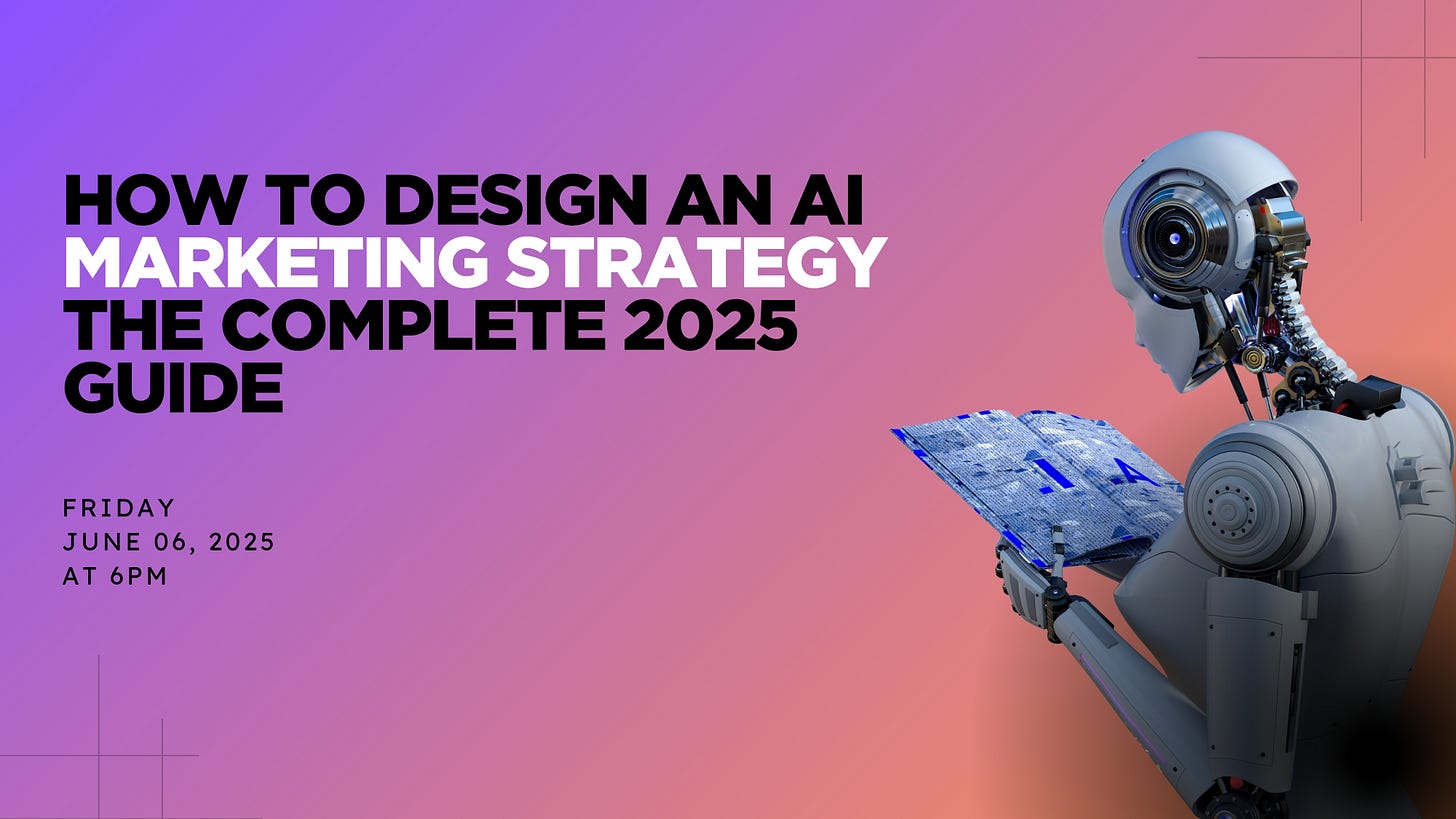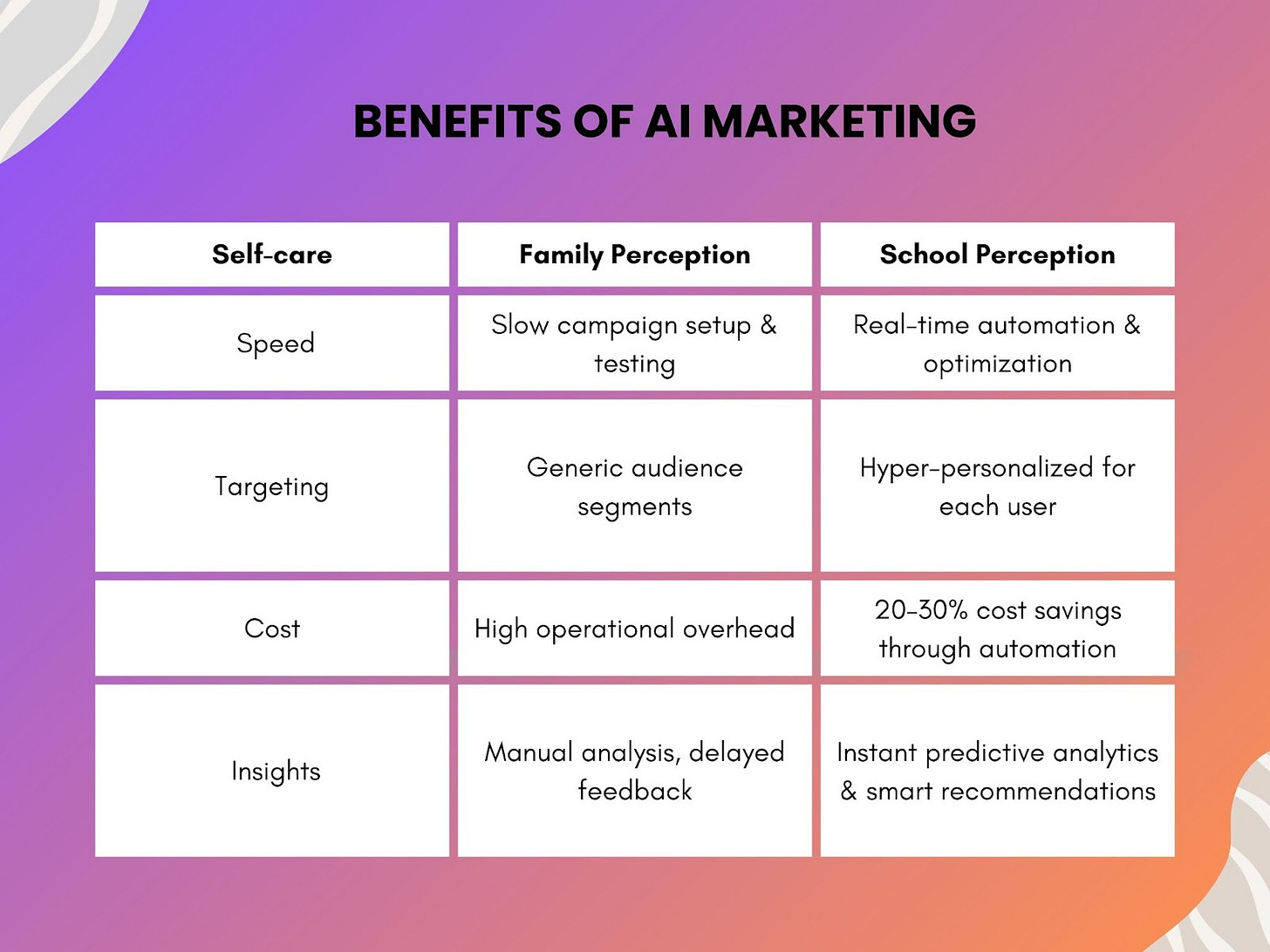How to Design an AI Marketing Strategy: The Complete 2025 Guide
The marketing landscape has fundamentally shifted. Traditional marketing strategies relied on intuition, broad demographic targeting, and manual campaign management. Today, successful businesses leverage artificial intelligence (AI) to create hyper-personalized, data-driven marketing experiences that adapt in real-time. With AI marketing technology becoming more accessible, businesses of all sizes can compete with enterprise-level marketing sophistication. However, success requires a comprehensive strategy that aligns AI capabilities with business objectives, customer needs, and organizational resources.
What is an AI Marketing Strategy?
An AI marketing strategy is a comprehensive plan that utilizes artificial intelligence technologies to enhance marketing effectiveness, efficiency, and personalization across all customer touchpoints. Unlike traditional marketing approaches that depend heavily on human analysis, AI marketing strategies employ machine learning algorithms, predictive analytics, and automation to make data-driven decisions at scale.
Core Components of an AI Marketing Strategy
Data Intelligence and Analysis
Automated Decision Making and Execution
Personalization and Customer Experience Enhancement
Feedback Loops and Adaptive Learning
Data Intelligence and Analysis
AI consolidates data across silos CRM, social, web analytics, POS, and customer support then applies machine learning to find trends, predict behavior, and prioritize actions. It helps marketers understand what’s driving conversions and which audiences are most valuable. With AI, businesses can discover hidden correlations, such as how weather patterns affect purchase behavior, or how past engagement predicts future churn.
Automated Decision Making and Execution
AI systems can auto-adjust Google Ads bidding based on ROI, send hyper-personalized email journeys triggered by in-app behavior, or A/B test content and make changes mid-campaign all without waiting on manual intervention. This reduces lag time between insight and action, enabling marketing teams to focus on high-level strategy instead of daily execution tasks.
Personalization and Customer Experience Enhancement
AI enables “segment of one” marketing. Think Netflix’s recommendations or Spotify’s personalized playlists you can now bring that same level of relevance to ecommerce product suggestions, email subject lines, and web content. AI analyzes behavior in real-time to adjust messaging across touchpoints, resulting in higher engagement, loyalty, and sales.
Feedback Loops and Adaptive Learning
With every campaign, AI models get smarter. Instead of one-and-done insights, your strategy evolves continuously based on real-time feedback. AI observes, learns, and refines actions helping marketers stay responsive in a fast-changing landscape. This adaptive capability ensures campaigns remain relevant and performance over time.
Why Businesses are Adopting AI Marketing Strategies Now
Data Explosion and Processing Limitations
Rising Customer Expectations for Personalization
Competitive Pressure and Market Efficiency
Economic Pressures and Efficiency Demands
Data Explosion and Processing Limitations
Brands generate enormous volumes of data across channels, but legacy systems struggle to keep up. AI unlocks value from this data by detecting patterns, anomalies, and predictive signals that humans can’t identify at scale. Instead of drowning in analytics dashboards, marketers get clear, prioritized actions.
Rising Customer Expectations for Personalization
Today’s consumers expect experiences that feel personal, seamless, and real-time. AI makes this possible by analyzing customer behavior and adjusting messaging dynamically. Personalization isn’t a “nice to have” anymore it’s expected.
Competitive Pressure and Market Efficiency
As AI tools become more accessible, businesses that fail to adopt them risk falling behind. AI-powered competitors move faster, acquire customers more efficiently, and deliver better experiences. The performance gap is widening.
Economic Pressures and Efficiency Demands
Economic uncertainty has increased pressure on marketing teams to prove ROI and operate lean. AI drives efficiency by automating tasks, improving targeting, and eliminating waste. Businesses can reallocate time and budget toward more strategic growth efforts.
How AI Marketing Strategy Development Works
Strategic Assessment and Goal Definition
Data Architecture and Infrastructure Planning
Technology Selection and Integration Planning
Performance Measurement and Optimization Framework
Strategic Assessment and Goal Definition
Start by auditing your current marketing performance. Identify friction points in the funnel and set measurable objectives such as increasing conversion rates, improving engagement, or reducing churn. Align your AI efforts with broader business goals to ensure focus and clarity.
Data Architecture and Infrastructure Planning
AI success hinges on high-quality data. Audit your sources (CRM, web, email, POS, etc.), identify gaps, and build a solid foundation for data collection, governance, and integration. Investing here pays dividends across your entire AI strategy.
Technology Selection and Integration Planning
Choose AI tools based on business needs, technical capabilities, and ease of integration. Evaluate platforms not just for features but for how well they work with your existing tech stack. Prioritize flexibility and scalability.
Performance Measurement and Optimization Framework
Define KPIs from the outset like lead quality, CAC, LTV, or campaign ROI. AI enables real-time monitoring and experimentation. Build dashboards and feedback loops that guide continuous improvement.
Benefits of Implementing AI-Driven Marketing Strategies
Hyper-Personalization at Scale
Efficiency Gains and Cost Reduction
Smarter, Faster Decision Making
Predictive Insights for Proactive Action
Hyper-Personalization at Scale
AI tailors content, timing, and channels for each customer. Whether suggesting products, sending emails, or serving ads, AI ensures relevance. This improves engagement, conversion, and loyalty often dramatically.
Efficiency Gains and Cost Reduction
AI automates manual tasks like segmentation, testing, and reporting. It reduces overhead, shortens campaign cycles, and minimizes wasted spend. Many organizations report 20–30% cost savings after full AI implementation.
Smarter, Faster Decision Making
AI ingests massive datasets and turns them into instant insights. Marketers can test dozens of variables at once, understand audience preferences in real time, and take data-driven actions all without waiting for quarterly reviews.
Predictive Insights for Proactive Action
AI anticipates outcomes. It forecasts churn, predicts sales trends, and recommends next-best actions. Businesses can act before problems arise or before opportunities are missed, shifting from reactive to proactive marketing.
Conclusion
Designing an effective AI marketing strategy represents a significant opportunity for business growth. Organizations that successfully implement AI-driven marketing approaches achieve substantial improvements in efficiency, personalization, and overall performance. Success requires strategic thinking, careful planning, and a commitment to continuous optimization.





